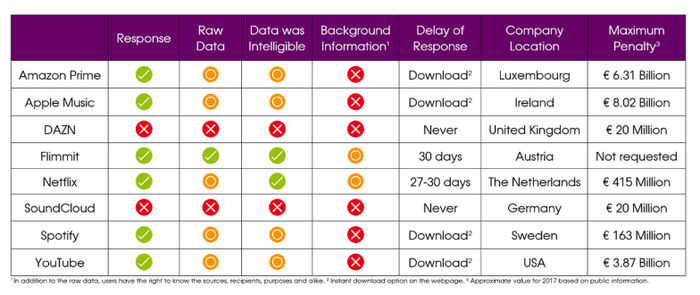Privacy champion Max Schrems is back with another lawsuit
The man who is largely credited with the downfall of Safe Harbour has re-emerged from the shadows to take eight of the internet giants to court over GDPR violations.
January 21, 2019

The man who is largely credited with the downfall of Safe Harbour has re-emerged from the shadows to take eight of the internet giants to court over GDPR violations.
As user privacy increasingly seems to be an alien concept to Silicon Valley and the other internet players, Austrian data privacy champion Max Schrems has jumped into the limelight once again. This time he is challenged eight internet companies and their data privacy practices, suggesting they are violating Europe’s General Data Protection Regulation (GDPR).
Through a filing with the Austrian Data Protection Authority, by Schrem’s non-profit NOYB, the complaints focus on the ‘right to access’ enshrined in Article 15 GDPR and Article 8(2) of the Chart of Fundamental Rights. Amazon, Apple, DAZN, Filmmit, Netflix, Sound Cloud, Spotify and YouTube are on the receiving end of the lawsuit, with the potential penalties ranging from €20 million through to €8 billion.
“Many services set up automated systems to respond to access requests, but they often don’t even remotely provide the data that every user has a right to,” said Schrems. “In most cases, users only got the raw data, but, for example, no information about who this data was shared with. This leads to structural violations of users’ rights, as these systems are built to withhold the relevant information.”
GDPR is supposed to hand control of personal data back to said individual. Its aim is to hold the digital society accountable to their actions and provide a certain level of justification for holding onto, and potentially monetizing, an individual’s personal information. Several clauses are also aimed at transparency to ensure the user is fully informed, or at least offering the user the opportunity to be, about how these software and services providers commercialise data.
In addition to what raw data is being stored, individuals do now also have the right to know where this data was sourced, the recipients and also the purpose. This is where a few of the complaints are focusing specifically, as this is the information which was absent from some of the responses.
If privacy is an alien concept, then transparency is a dirty, inconceivable word to the internet players. It seems former habits have been hard to shake.

As you can see from the table above, Schrems has tested out how some of the internet players have reacted to the introduction of GDPR. Progress has been made, except in the case of Sound Cloud and DAZN, but that is irrelevant. The introduction of GDPR on May 25 2018 was not the starting line to gradually move yourself through to compliance, day one was a hard introduction of the rules. There are some circumstances where companies can avoid penalties, but these are scenarios where non-compliance would be seen as out of the control of the company, or best efforts have been made.
This is where these firms might find themselves in a bit of hot water. An automated response which offers up some information but not all which is required through the new regulation should not be considered good enough. The pair ignoring the requests completely should be very worried about the repercussions. And finally, the Austrian regulator will also have to decide whether four weeks is an appropriate response time or too long. None of these firms are in a safe place right now.
Another interesting aspect will be the readability of the data. In the complaint, Schrems notes the raw data was provided in what would be considered cryptic form for the general public. Users would not be able to read the data therefore it is not being made accessible by the company. Whether this is taken as a violation of GDPR remains to be seen, though Austria could set precedent.
Many of the internet giants have resisted the calls from data privacy advocates and governments around the world, but GDPR is supposed to be a stick to keep the segment in line. These are companies which will want to avoid giving too many details away as the power and depth of the data sharing economy has the potential to spook large swathes of the general public. Too much light shed on data processing and exchanging practices would also offer more ammunition to the blood-thirsty politicians, many of whom are on a PR crusade to make heads roll.
Ultimately this will give us a good indication as to how sharp European regulators’ teeth actually are. In passing GDPR, the European Commission has offered a stick to the pro-privacy regulators, but how hard they swing it remains to be seen. The dreaded ‘up to’ phrase is present when looking at potential fines, so let’s see whether these regulations have the stones to dish out appropriate punishments.
About the Author
You May Also Like


.png?width=300&auto=webp&quality=80&disable=upscale)







.png?width=300&auto=webp&quality=80&disable=upscale)


_1.jpg?width=300&auto=webp&quality=80&disable=upscale)